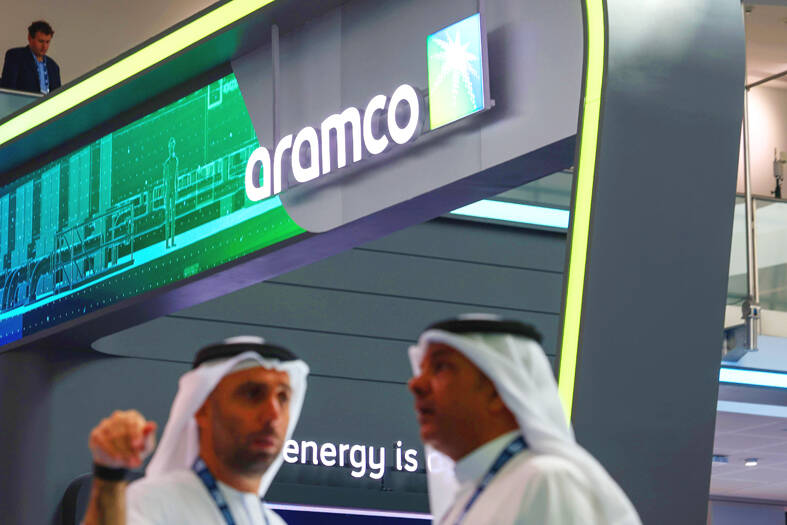Norway’s largest pension fund yesterday said that it has divested from Saudi Arabian Oil Co (Saudi Aramco) due to the oil giant’s lack of climate action and from 11 other Gulf companies over human rights concerns.
KLP, which manages more than 700 billion kroner (US$70 billion), said that the exclusion amounted to US$15 million.
The fund dropped 11 companies in the telecommunications and real-estate sectors from Kuwait, Qatar, Saudi Arabia and the United Arab Emirates “over unacceptably high human rights violations’ risks.”

Photographer: Christopher Pike/Bloomberg
Saudi Aramco was blacklisted due to its ties to the Saudi Arabian government, and for “contravening expectations over climate and energy transition plans,” the fund said.
“The overall rationale for these exclusions is that Gulf states remain characterized by authoritarian systems of government that restrict freedom of expression and political rights, including of critics and human rights activists,” Kiran Aziz, head of responsible investment at KLP, said in a statement.
The telecoms were excluded because “the development of advanced technology, including AI [artificial intelligence], reinforces the ongoing risk of systematic surveillance and censorship,” Aziz said.
He added that reforms have “not gone far enough” in the real-estate sector, where African and Asian migrant workers have faced discrimination and human rights violations.
Saudi Aramco is 90 percent owned by Saudi Arabia and was excluded primarily due to its lack of an energy transition plan, the fund said.
“The company’s climate policy and lobbying efforts reflect the dominant owner’s active opposition to the phasing out of oil and gas as a climate mitigation measure,” it said in a statement.

TAKING STOCK: A Taiwanese cookware firm in Vietnam urged customers to assess inventory or place orders early so shipments can reach the US while tariffs are paused Taiwanese businesses in Vietnam are exploring alternatives after the White House imposed a 46 percent import duty on Vietnamese goods, following US President Donald Trump’s announcement of “reciprocal” tariffs on the US’ trading partners. Lo Shih-liang (羅世良), chairman of Brico Industry Co (裕茂工業), a Taiwanese company that manufactures cast iron cookware and stove components in Vietnam, said that more than 40 percent of his business was tied to the US market, describing the constant US policy shifts as an emotional roller coaster. “I work during the day and stay up all night watching the news. I’ve been following US news until 3am

UNCERTAINTY: Innolux activated a stringent supply chain management mechanism, as it did during the COVID-19 pandemic, to ensure optimal inventory levels for customers Flat-panel display makers AUO Corp (友達) and Innolux Corp (群創) yesterday said that about 12 to 20 percent of their display business is at risk of potential US tariffs and that they would relocate production or shipment destinations to mitigate the levies’ effects. US tariffs would have a direct impact of US$200 million on AUO’s revenue, company chairman Paul Peng (彭雙浪) told reporters on the sidelines of the Touch Taiwan trade show in Taipei yesterday. That would make up about 12 percent of the company’s overall revenue. To cope with the tariff uncertainty, AUO plans to allocate its production to manufacturing facilities in

Six years ago, LVMH’s billionaire CEO Bernard Arnault and US President Donald Trump cut the blue ribbon on a factory in rural Texas that would make designer handbags for Louis Vuitton, one of the world’s best-known luxury brands. However, since the high-profile opening, the factory has faced a host of problems limiting production, 11 former Louis Vuitton employees said. The site has consistently ranked among the worst-performing for Louis Vuitton globally, “significantly” underperforming other facilities, said three former Louis Vuitton workers and a senior industry source, who cited internal rankings shared with staff. The plant’s problems — which have not

COLLABORATION: Given Taiwan’s key position in global supply chains, the US firm is discussing strategies with local partners and clients to deal with global uncertainties Advanced Micro Devices Inc (AMD) yesterday said it is meeting with local ecosystem partners, including Taiwan Semiconductor Manufacturing Co (TSMC, 台積電), to discuss strategies, including long-term manufacturing, to navigate uncertainties such as US tariffs, as Taiwan occupies an important position in global supply chains. AMD chief executive officer Lisa Su (蘇姿丰) told reporters that Taiwan is an important part of the chip designer’s ecosystem and she is discussing with partners and customers in Taiwan to forge strong collaborations on different areas during this critical period. AMD has just become the first artificial-intelligence (AI) server chip customer of TSMC to utilize its advanced